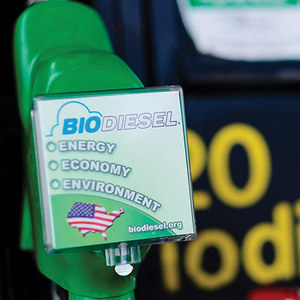West Coast market focus proves successful for biodiesel

January 12, 2016
BY The National Biodiesel Board
Nearly a decade ago, California embarked upon a landmark climate initiative commonly referred to as AB 32. The law requires greenhouse gas (GHG) emissions reductions to 1990 levels by 2020—a reduction of approximately 15 percent below expected emissions in a “business as usual” scenario. AB 32 includes a number of ambitious climate programs that call for reductions in every sector of the economy. The state’s low carbon fuel standard (LCFS) focuses on transportation.
“Over the past four years of the LCFS, the California biomass-based diesel market has grown from 10 million to 200 million gallons,” said Don Scott, director of sustainability at the National Biodiesel Board. “This shows how successful carbon policies can be at spurring growth in clean fuels like biodiesel.”
In part because of the success demonstrated in California, both Oregon and British Columbia have also adopted low carbon transportation policies, and they are setting precedent for the rest of the world. This means that approximately 5 billion gallons of diesel are now under low carbon fuel policies on the West Coast.
NBB has concentrated significant resources over the past eight years to ensure that biodiesel participates in these programs. The technical data developed by NBB played a significant role in the determinations by the California Air Resources Board confirming that biodiesel reduces GHG emissions by 50 to 80 percent compared to petroleum diesel. This makes biodiesel the lowest carbon liquid fuel available in today’s marketplace.
“Biodiesel is the most sustainable fuel on the planet,” Scott said. “But quantifying the precise carbon intensity of fuel from varying feedstocks, geographies, and process technologies does not happen without significant investment in data and scientific analysis. Lifecycle assessment is a complex undertaking that required participation from diverse stakeholders such as the California Biodiesel Alliance, our friends in the environmental community, and NBB members.”
On a national scale, biomass-based diesel has the potential to reduce carbon emissions by 40 million tons annually, or the equivalent of removing more than 30 million passenger cars from the road.
Advertisement
Advertisement
Related Stories
Avfuel Corp., the leading independent supplier of aviation fuel and services, is expanding its sustainable aviation fuel (SAF) footprint with the addition of a new, strategic supply point in Denver, Colorado—the first of its kind in the region.
ATOBA Energy and Air Moana are partnering to implement scalable solutions for the supply of SAF. The collaboration aims to ensure long-term SAF availability while supporting local initiatives to develop sustainable fuel production in Tahiti.
Kintetsu World Express Inc. has signed an additional agreement with Hong Kong, China-based Cathay Pacific Airways for the use of sustainable aviation fuel (SAF). The agreement expands a three-year partnership between the two companies.
Broco Energy on July 17 announced a new partnership with the Massachusetts Port Authority (Massport) to deliver and transition Massport's fuel tanks to renewable diesel across its various facilities.
Shell Aviation, Accenture, and Amex GBT on July 10 announced Avelia is in the process of evolving to an industry solution with independent data hosting and a multi-supplier model helping users access the GHG benefits of SAF.
Upcoming Events










